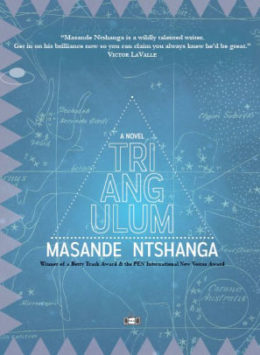Sometimes it can help to begin with the text behind the text. Masande Ntshanga’s Triangulum is a surreal puzzle box of a novel, presented as a series of found documents spanning both the recent past and the near future—but its first few lines come via a quartet of epigraphs, encompassing everything from the fiction of Kōbō Abe to the history of South Africa. Triangulum doesn’t lack for ambition and, as it gathers momentum, it conveys a sense of approaching dread, of events both historical and metaphysical approaching some horrific end point. This is a paranoid novel about the end of the world; this is also a novel about the power and ambiguity of apocalyptic narratives.
Triangulum opens in 2043, with a Foreword by Dr. Naomi Buthelezi. An acclaimed writer (with Hugo and Nebula wins to her credit), she is recruited by her colleague at the University of Cape Town, Dr. Hessler, for her assistance in reviewing a series of anonymous manuscripts suggesting that the world will end in 2050. This wouldn’t necessarily be something that merits an investigation, except that, in Hessler’s words, “[i]t predicted the present.” A bombing has taken place, one which created a trianglular symbol that features prominently in the manuscript.
The narrator of the manuscript within the novel (henceforth, “the narrator,” to distinguish her from Dr. Buthelezi) is a teenager in the earliest sections—the story here begins in 1999, and apartheid is still a recent memory for many. It’s at this point in the novel when several girls go missing, establishing some ambiguity as to whether their departure is due to the actions of people will ill intentions or something more uncanny. The different contexts in which the word “abduction” can be used takes on a substantial weight here.
As the manuscript moves into the future, writer Ntshanga establishes a haunting, surreal atmosphere: conspiracy theories, visions, and secret organizations all enter the narrative. Triangulum juxtaposes these elements with the narrator’s feelings about her own family, musings on her mental health, and a sense of her everyday life as she ponders solitude and the world around her.
In her Foreword, Dr. Buthelezi notes that one section of the manuscript is “coded more than usual, no doubt for protection.” Reading Triangulum, then, offers readers several options: one can take this narrative exactly as it is, or view certain of its events on a more metaphorical or nebulous level. This is one level in which Ntshanga offers readers a lens through which this text can be seen. Another is via the novel’s use of time: at certain moments, Ntshanga subtly reminds the reader that one person’s nightmarish future is another’s unthreatening past. Early on, the narrator sets the stage for a scene in 1999 by noting, in part, that “the world was ending because of a computer bug.”
This ambiguity never really gives way, which helps to accentuate the mood of memory, perception, and paranoia that pervades the novel. At times, the narrator’s words hauntingly give way to a triangle symbol emblazoned on the page. Throw in the increased narrative uncertainty of the novel’s nestled structure, an eco-terrorist group with roots in South Africa’s history, and the number of writers within the novel itself, and a sense of danger and unpredictability emerges.
Readers will note a website alluded to in a footnote in the novel’s Foreword; going there reveals Ntshanga’s list of sources for this book, which includes everything from the video game The Legend of Zelda: Link’s Awakening to Stanislaw Lem’s novel Eden. Tonally speaking, Ntshanga’s novel recalls Lem’s philosophical works in many ways: though it includes science fictional elements, it’s deeply concerned with their ramifications on all things sociopolitical, and of the way the uncanny can expose flaws in certain systems.
Magnificently disorienting and meticulously constructed, Triangulum couples an urgent subtext with an unceasing sense of mystery. This is a thought-provoking dream of a novel, situated within thought-provoking contexts both fictional and historical.
Triangulum is available from Two Dollar Radio.
Buy the Book


Triangulum
 Tobias Carroll is the managing editor of Vol.1 Brooklyn. He is the author of the short story collection Transitory (Civil Coping Mechanisms) and the novel Reel (Rare Bird Books).
Tobias Carroll is the managing editor of Vol.1 Brooklyn. He is the author of the short story collection Transitory (Civil Coping Mechanisms) and the novel Reel (Rare Bird Books).










